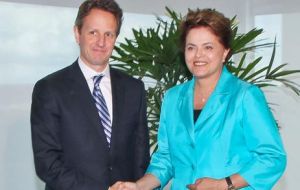MercoPress. South Atlantic News Agency
Geithner implicitly endorses “capital controls” during Brazilian visit
 US Treasury Secretary Geithner is receive by President Dilma Rousseff.
US Treasury Secretary Geithner is receive by President Dilma Rousseff. US Treasury Secretary Timothy Geithner reached out to Brazil by citing a shared concern - China - and endorsing Brazil's approach for dealing with global economic distortions.
On a one-day visit to Brazil, Geithner told an audience in Sao Paulo that emerging markets such as Brazil had been buffeted in recent years by other countries with large current account surpluses and inflexible currencies.
Geithner did not mention China by name. Yet his comments will likely be well-received by the Brazilian government, which is seeking closer ties with Washington in part out of hope that the two countries can work together to convince China to let its currency appreciate faster.
“As countries with large surpluses act to strengthen domestic demand in their economies, open their capital markets and allow their currencies to reflect fundamentals, we will see more balance in the flow of capital, less upward pressure on Brazil's currency, and more robust growth in Brazil's exports, especially manufacturing exports,” Geithner said at a think-tank in Sao Paulo.
Geithner also added that countries such as Brazil that face an “outsized burden” due to their strong currencies “may need to adopt carefully designed macro-prudential measures” - a tacit endorsement of capital controls that Brazil has recently implemented to ease strong inflows.
Geithner's comments came three days after the Treasury released a long-delayed report that declined to name China as a currency manipulator, but said the Yuan was “substantially undervalued.”
Geithner's visit is also designed to lay the groundwork for a trip by US President Barack Obama in March, which officials on both sides say will signal a better era of cooperation between the Western Hemisphere's two biggest economies.
“The United States is thrilled with the language the Brazilian government has been using in regards to global economic issues, in particular, regarding China,” said Mauricio Cardenas, director of the Latin America studies program at the Brookings Institution, a Washington think tank




Top Comments
Disclaimer & comment rulesCommenting for this story is now closed.
If you have a Facebook account, become a fan and comment on our Facebook Page!